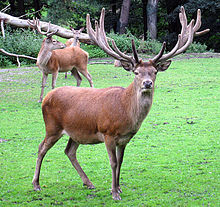cervus
Jump to navigation
Jump to search
See also: Cervus
Latin
[edit]
Alternative forms
[edit]Etymology
[edit]From Proto-Italic *kerwos, from Proto-Indo-European *ḱr̥h₂wós, from *ḱerh₂- (“horn”) (whence English horn, hirn, Latin cornū (“horn”)) + *-wós (whence Latin -vus).
Cognate with Welsh carw (“deer”), Greek κεραός (keraós, “horned”). The first-syllable e was likely taken from the PIE root noun *ḱerh₂s (“horn”) (itself eventually lost in Latin), while the shift in meaning from 'horned' to 'deer' may be common Italo-Celtic.[1]
Pronunciation
[edit]- (Classical Latin) IPA(key): /ˈker.u̯us/, [ˈkɛru̯ʊs̠]
- (modern Italianate Ecclesiastical) IPA(key): /ˈt͡ʃer.vus/, [ˈt͡ʃɛrvus]
Noun
[edit]cervus m (genitive cervī); second declension
Declension
[edit]Second-declension noun.
| Case | Singular | Plural |
|---|---|---|
| Nominative | cervus | cervī |
| Genitive | cervī | cervōrum |
| Dative | cervō | cervīs |
| Accusative | cervum | cervōs |
| Ablative | cervō | cervīs |
| Vocative | cerve | cervī |
Derived terms
[edit]Descendants
[edit]- Balkan Romance:
- Gallo-Italic:
- Gallo-Romance:
- Ibero-Romance:
- Italo-Dalmatian:
- Sardinian:
- Borrowings:
References
[edit]- ^ De Vaan, Michiel (2008) Etymological Dictionary of Latin and the other Italic Languages (Leiden Indo-European Etymological Dictionary Series; 7)[1], Leiden, Boston: Brill, →ISBN
Further reading
[edit]- “cervus”, in Charlton T. Lewis and Charles Short (1879) A Latin Dictionary, Oxford: Clarendon Press
- “cervus”, in Charlton T. Lewis (1891) An Elementary Latin Dictionary, New York: Harper & Brothers
- cervus in Charles du Fresne du Cange’s Glossarium Mediæ et Infimæ Latinitatis (augmented edition with additions by D. P. Carpenterius, Adelungius and others, edited by Léopold Favre, 1883–1887)
- cervus in Gaffiot, Félix (1934) Dictionnaire illustré latin-français, Hachette.
Categories:
- Latin terms derived from Proto-Indo-European
- Latin terms derived from the Proto-Indo-European root *ḱerh₂-
- Latin terms inherited from Proto-Italic
- Latin terms derived from Proto-Italic
- Latin terms inherited from Proto-Indo-European
- Latin 2-syllable words
- Latin terms with IPA pronunciation
- Latin lemmas
- Latin nouns
- Latin second declension nouns
- Latin masculine nouns in the second declension
- Latin masculine nouns
- la:Male animals
- la:Cervids
- la:Military
- Latin terms suffixed with -vus